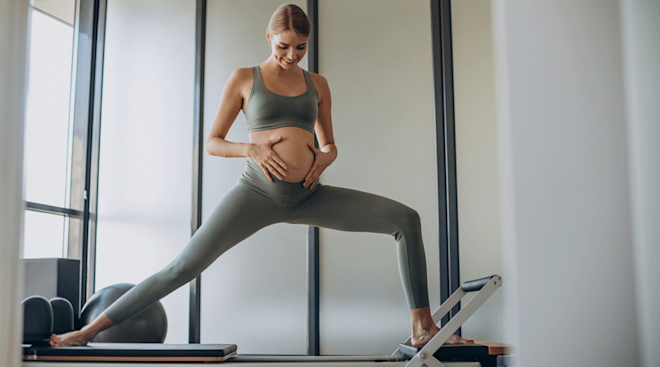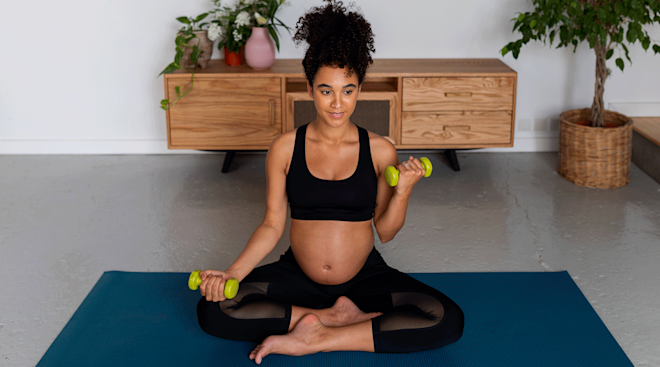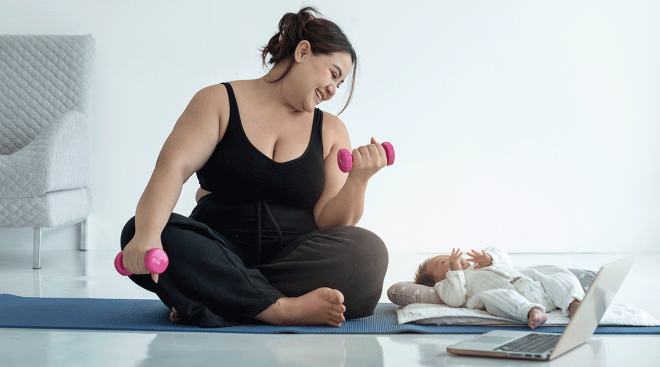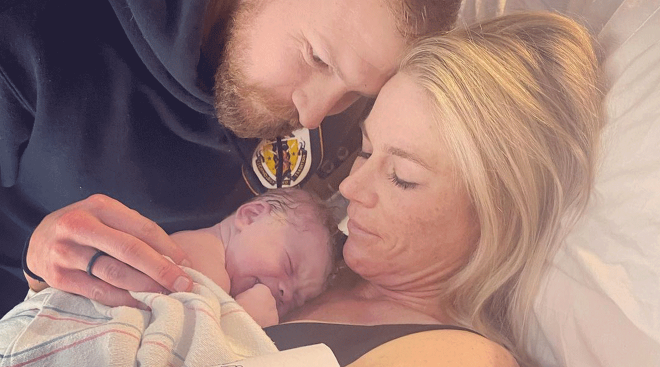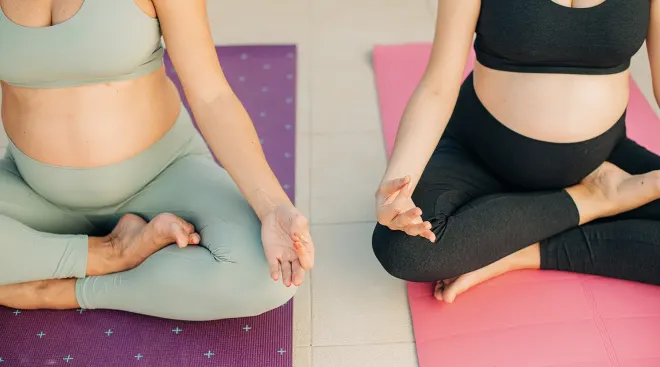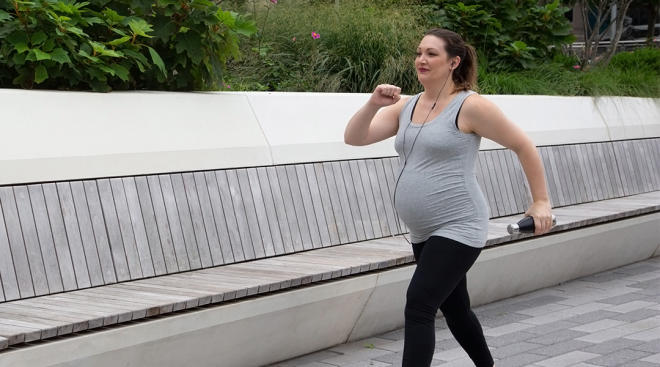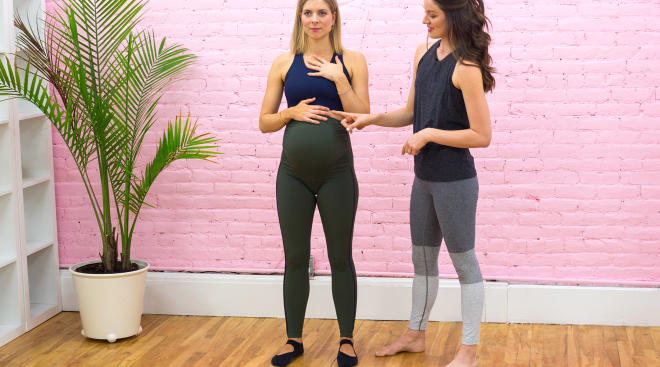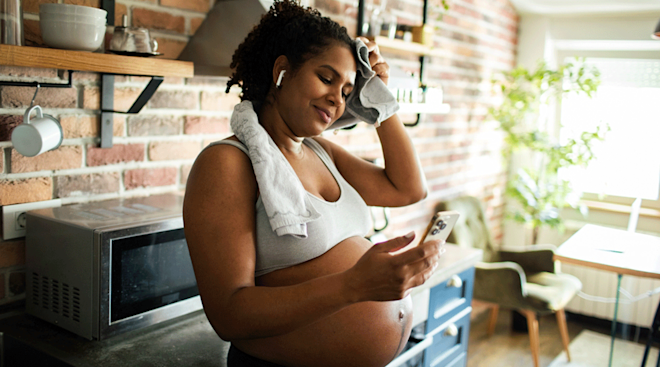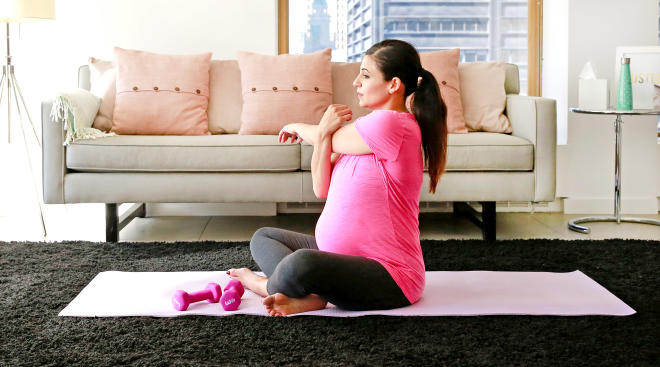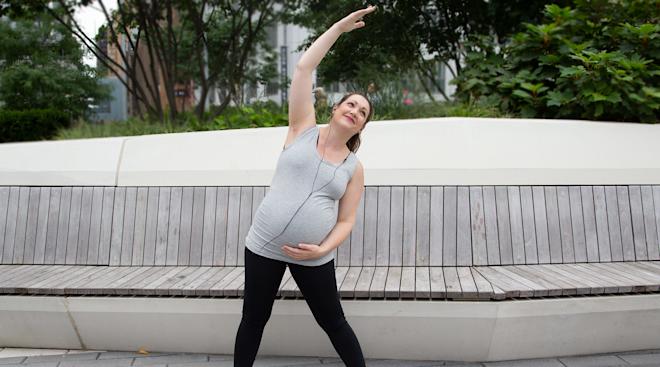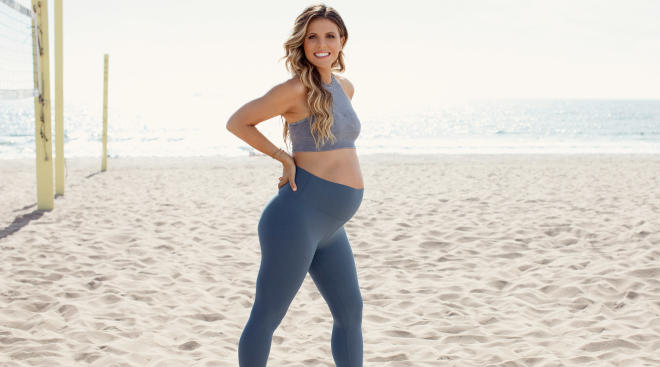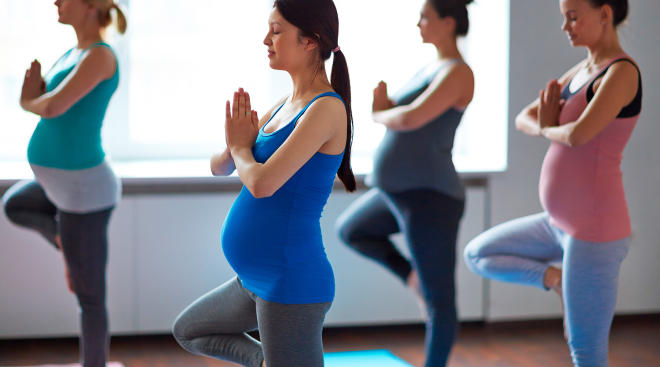8 Benefits of Exercise During Pregnancy
Exercise has long been proven to improve physical and mental health—but finding the motivation to hit the gym can be hard during pregnancy. After all, a growing baby brings many changes to your body and mood, like morning sickness, heartburn and sleep deprivation. But as hard as it may be, numerous studies have shown the benefits of exercise during pregnancy. Below, experts walk us through why it’s important to make prenatal exercise a priority when you can.
Both the American College of Obstetricians and Gynecologists and the American Pregnancy Association note there are several benefits of working out during pregnancy. These include reduced back and pelvic pain, healthy weight gain, improved endurance, faster postpartum recovery and improved ability to cope with the demands of labor. Plus, prenatal exercise can also benefit baby’s development and growth later in life. Below, some of the biggest benefits of prenatal exercise.
1. Reduces your aches and pains
During pregnancy, your body relaxes your joints, ligaments and connective tissues to help make room for baby and prepare for birth. But “this can lead to instability in the pelvis, causing low back pain and pelvic pain (two very common pregnancy complaints),” says Sarah Bradford, a pre- and postnatal fitness specialist. Prenatal exercises that help strengthen muscles in your pelvic floor, core and glutes can help improve stability and reduce pain. Plus, the stronger your core and stabilizing muscles, the better your body will be able to carry the weight of your growing bump. A 2019 study backs this up, finding that exercise during pregnancy can help reduce low back pain, among other common pregnancy ailments.
2. Helps ward off constipation
Along with reducing pain, studies show that exercise during pregnancy also helps ease constipation, which is a common issue during pregnancy. “Exercising increases breathing rate as well as heart rate, which stimulates the nerves and muscles of the mucosal lining of the digestive tract,” Bradford explains. “This can help to get things moving.” Plus, because tight pelvic floor muscles also contribute to constipation, exercises that lessen pelvic floor tension can also make it easier to pass bowel movements, she adds. Bonus: Decreasing your risk of constipation will also help with those pesky hemorrhoids.
3. Boosts your mood
Growing a tiny human inside of you is hard work, so it’s par for the course to get a little grumpy from time to time. But a little bit of exercise goes a long way toward improving your mood—and there’s actual science behind this. Several studies, including these from 2004, 2006 and 2018, have found exercise increases heart rate and blood flow to the brain, as well as triggers the release of endorphins, which are known as the body’s “feel-good” hormones.
4. Promotes better sleep
Another benefit of exercise during pregnancy? Along with improved mood, you’ll also likely experience improvements in sleep. “It makes the body more tired, which makes it easier to fall asleep and stay asleep at night,” explains Rebekah Mustaleski, CPM, a certified professional midwife and compression director at Motif Medical.
5. Lowers your risk of pregnancy complications
All pregnant women are naturally at risk for gestational diabetes. The placenta produces hormones that, while helping to maintain a healthy pregnancy, cause a buildup of glucose in the blood. “Normally, the pancreas produces enough insulin to counteract this,” Bradford says, but when the body isn’t able to keep blood sugar levels balanced, it can lead to gestational diabetes. Plus, because elevated blood sugar can cause higher blood pressure, pregnancy can also cause a risk of preeclampsia, which can lead to preterm labor and low birth weight. While this sounds scary, several studies have found that exercise during pregnancy helps control blood glucose, significantly decreasing the risk of developing these conditions. Plus, exercise during pregnancy also helps reduce cardiovascular risk factors, Bradford says, as it helps strengthen the heart, reduce oxidative stress and lowers blood pressure.
6. Supports an easier and faster labor
Childbirth is a major physical event—experts have likened it to running a marathon—so it’s no secret that strong muscles and improved endurance will be helpful during childbirth. Several studies—including these 2019 and 2021 studies—have found that weekly exercise during pregnancy can decrease how much time a woman spends in labor. In fact, according to a 2018 study, weekly prenatal exercise can actually shorten labor time by about an hour. “During labor, you want your muscles to be able to work effectively for as long as needed,” Mustaleski says. “As your baby works their way through your pelvic bones, you’ll want to be able to move in ways that allow space for your baby to descend and rotate.” Tight hip and pelvic muscles can actually hinder baby’s ability to smoothly move down into the birth canal, but regular exercise can help improve flexibility, she adds.
7. Helps prevent tearing and medical interventions
Strong pelvic floor muscles go hand-in-hand with easier childbirth, which often involves less tearing and fewer medical interventions—and several studies back this up. According to one 2017 study, prenatal pelvic floor training can help decrease tearing during delivery, episiotomies and rates of induced labor and c-sections. “Regular physical movement, especially at the end of your pregnancy, will help baby get into an optimal position for birth, which ultimately reduces the risk of perineal tearing and the need for a cesarean section,” Mustaleski says. “Maternal exhaustion can also play a role in tearing and c-sections, which will be reduced with prenatal exercise.”
8. Improves baby’s health
Exercise is important in managing your pregnancy weight gain, and research suggests that how much weight a woman gains during pregnancy influences her child’s birth weight. According to a 2010 study, more weight gain during pregnancy increases baby’s chances of having a higher birth weight, which may lead to a higher body mass index later in life. Plus, prenatal exercise has also been proven to help baby’s organ development and decrease their chances of developing chronic diseases (like obesity, diabetes and cardiovascular disease) later on in life. Furthermore, according to a 2019 study, prenatal exercise can boost baby’s neuromotor skills, helping them be more active later in life, as well as give them a stronger, athletic heart rate at birth. “Women who regularly exercise during pregnancy tend to have babies that have lower heart rates and stronger cardiovascular systems,” Mustaleski says. In other words, working out while pregnant helps set baby up for a healthy, active life.
Now that you know some of the benefits of exercise during pregnancy, you may be wondering how to start. The first step is to always consult with your doctor to make sure you’re cleared to exercise while pregnant. Once you have the green light, ACOG recommends aiming for about 150 minutes of exercise per week, split up into hour-long, 30-minute or 10-minute sessions. This may sound intimidating, but Mustaleski cites walking as one of the best and easiest prenatal exercises. “You can go for a walk around your neighborhood or meet a friend at a park,” she says. “Prenatal yoga and swimming are other wonderful options to get started with during pregnancy.”
If you’re looking for a more tailored routine, it might be helpful to find a prenatal-specific program or work with a prenatal fitness specialist to stay active. “Your body goes through a huge transformation during pregnancy,” Bradford says. “Working with someone who not only understands the unique physiological changes that take place in the body throughout pregnancy but is actually certified in pre- and postnatal exercise can ensure that the exercises you’re doing are safe and beneficial.” (Online prenatal workouts are a great way to get started!) The most important aspect of finding the right exercise routine? Make sure it’s one you’ll enjoy and will stay consistent with.
Please note: The Bump and the materials and information it contains are not intended to, and do not constitute, medical or other health advice or diagnosis and should not be used as such. You should always consult with a qualified physician or health professional about your specific circumstances.
Plus, More from The Bump:
Sarah Bradford, CPT, CNC, is a certified pre- and postnatal trainer, as well as a diastasis recti and core rehabilitation specialist. She received her certifications from Fit For Birth in 2016. In 2020, Bradford launched LUNA Mother Collective, a virtual fitness platform and mobile app, and serves as the company’s CEO.
Rebekah Mustaleski, CPM-TN, IBCLC, is a certified professional midwife specializing in evidence-based maternity care. She co-founded Roots & Wings Midwifery in Knoxville, Tennessee. Mustaleski received her bachelor’s degree in psychology from Centre College and worked as a doula and birth photographer prior to establishing Roots & Wings.
American College of Obstetricians and Gynecologists, Exercise During Pregnancy, March 2022
American Pregnancy Association, Exercise During Pregnancy, 2023
International Journal of Environmental Research and Public Health, Effectiveness of Physical Activity Interventions on Pregnancy-Related Outcomes among Pregnant Women: A Systematic Review, May 2019
PLOS ONE, Epidemiology and Risk Factors of Functional Constipation in Pregnant Women, July 2015
The Journal of Clinical Psychiatry, The Benefits of Exercise for the Clinically Depressed, June 2004
The Journal of Clinical Psychiatry, Exercise for Mental Health, April 2006
Frontiers in Psychology, Acute Bouts of Exercising Improved Mood, Rumination and Social Interaction in Inpatients With Mental Disorders, March 2018
Nursing for Women's Health, Exercise and the Prevention of Gestational Diabetes Mellitus, June 2021
International Journal of Environmental Research and Public Health, Physical Activity Programs during Pregnancy Are Effective for the Control of Gestational Diabetes Mellitus, September 2020
British Journal of Sports Medicine, Prenatal exercise for the prevention of gestational diabetes mellitus and hypertensive disorders of pregnancy: a systematic review and meta-analysis, January 2017
Frontiers in Pediatrics, Gestational Diabetes: Physical Activity Before Pregnancy and Its Influence on the Cardiovascular System, August 2020
PeerJ, Physical activity during pregnancy and its influence on delivery time: a randomized clinical trial, February 2019
American Journal of Obstetrics & Gynecology, The impact of physical activity during pregnancy on labor and delivery, June 2021
European Journal of Obstetrics and Gynecology and Reproductive Biology, Exercise during pregnancy is associated with a shorter duration of labor. A randomized clinical trial, May 2018
Annals of Agricultural and Environmental Medicine, Influence of prenatal physical activity on the course of labour and delivery according to the new Polish standard for perinatal care, February 2013
Midwifery, Influence of a pelvic floor training programme to prevent perineal trauma: A quasi-randomised controlled trial, July 2017
BMC Pregnancy and Childbirth, The effect of yoga on the delivery and neonatal outcomes in nulliparous pregnant women in Iran: a clinical trial study, May 2021
American Journal of Obstetrics & Gynecology, Exercise during pregnancy and risk of cesarean delivery in nulliparous women: a large population-based cohort study, August 2016
Lancet, The Relationship Between Pregnancy Weight Gain and Birth Weight: A Within Family Comparison, August 2010
Lancet, The association between pregnancy weight gain and birthweight: a within-family comparison , September 2010
Clinical Medicine Insights: Women's Health, The Influence of Prenatal Exercise on Offspring Health: A Review, October 2016
Medicine & Science in Sports & Exercise, Effects of Aerobic Exercise during Pregnancy on 1-Month Infant Neuromotor Skills, August 2019
ResearchGate, Gestational Exercise effects on the Infant Heart, April 2011
American College of Obstetricians and Gynecologists, Exercise During Pregnancy, March 2022
Learn how we ensure the accuracy of our content through our editorial and medical review process.
Navigate forward to interact with the calendar and select a date. Press the question mark key to get the keyboard shortcuts for changing dates.

































